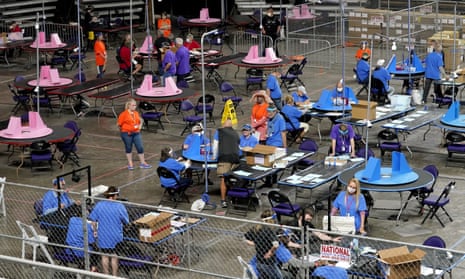Happy Thursday.
By all accounts, the election “audit” in Arizona is a failure – months past its initial deadline, potentially in violation of federal law and riddled with mistakes.
Therefore, it’s unsurprising that the auditors are fighting to shield their operation from public records requests and to hide their donors. Still, somehow, the review has inspired copycats around the country.
A Republican legislator in Pennsylvania recently threatened three counties with a subpoena if they don’t turn over their voting machines, computer system logs and voters’ personal information, a move that reportedly has the support of senior party officials.
Meanwhile, Republicans in Texas are attempting to pass a bill that would force an audit of the November 2020 election, beginning 1 November 2021 and continuing into 2022.
These legislators are clearly hoping to earn political capital from pushing a popular myth among Republicans – but will these sham audits ultimately backfire on them?
On one hand, this is an easy way to continue stoking hysteria about the 2020 election, especially as all but the most loyal Trump supporters eventually lose interest and move on.
And when it comes to disinformation, these reviews offer a nearly bottomless well. For example, an auditor in Arizona recently claimed to have found “74,243 mail-in ballots where there is no clear record of them being sent [out to voters]”.
In reality, the team had failed to account for in-person early voting, which one expert called a “glaring omission from the analysis” that was either “grossly negligent” or “deliberately misleading”. However, as political theatre, the move was a success, generating viral tweets and a written statement from the former president.
Still, this strategy is fraught. In Arizona, the Republican-controlled board of supervisors did nearly everything possible to resist the review, and it’s easy to see why. After weathering a pandemic and facing down hostile mobs, these officials were then being accused of incompetence at best and complicity in a vast conspiracy at worst.
Already, the two Pennsylvania counties controlled by Republicans have said they won’t comply voluntarily with the request, and though election administrators don’t have the same platform as grandstanding politicians, it isn’t great optics to bully fellow Republicans to conduct an audit that will almost certainly reveal no fraud, as was the case recently in Michigan.
On some level, it’s clear politicians know this. In February, the Arizona senate tried to arrest the Maricopa county board of supervisors but failed after a Republican defected.
In addition, Maricopa county announced last month that it wouldn’t use many of the machines used in the review, which the Arizona secretary of state had already threatened to decertify because of potential security risks – demonstrating again that actions have consequences.
So, will Republicans outside Arizona move past political posturing and actually conduct more sham reviews? Perhaps, and at their peril.
Today’s post was guest-written by Spenser Mestel, a poll worker and journalist with his own voting rights newsletter.
Also worth watching …
A federal appeals court has blocked an Indiana law that would have made it easier to remove voters from the rolls, which was a revised version of a 2017 law that was also struck down.
You’ve probably heard about the gubernatorial recall in California – but another one in Alaska, initiated in 2019, was just greenlit by the state’ssupreme court.
After originally stating that he wouldn’t allow any additional voting ID requirements, Pennsylvania’s governor now says that he’s open to the possibility, specifically for absentee voting.
